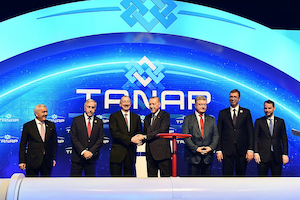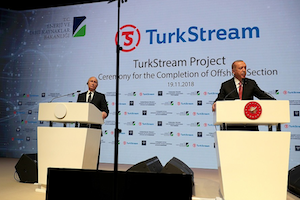Turkey's Natural Gas Strategy Faces Obstacles
By Natalia Konarzewska
March 23, 2020
On January 8, 2020, Turkey's President Recep Tayyip Erdoğan and his Russian counterpart Vladimir Putin attended the opening ceremony of TurkStream, the natural gas pipeline that is envisaged to carry Russian gas to Turkey and then to Southeastern Europe. A month earlier, Erdoğan and Azerbaijan's President İlham Aliyev inaugurated another gas project that Turkey participates in, the Trans Anatolian Gas Pipeline (TANAP) and which will deliver Azerbaijani gas to Turkey and to southern Europe. Yet TurkStream and TANAP offer mixed prospects for advancing Turkey's strategy to become an energy transit state for Europe because of limitations of capacity and unclear or limited perspectives of expansion. Even though both pipelines are seen as cornerstones of Turkey's gas strategy, they are in fact being brought to completion at a time when Ankara tries to reduce its dependency on pipeline gas and seeks to benefit from the booming liquified natural gas market.

TurkStream: Ankara Embraces Russia to Further Turkey's Hub Ambitions
By Micha’el Tanchum
December 20, 2018
On November 19, 2019, Turkish President Recep Tayyip Erdoğan and Russian President Vladimir Putin held a joint ceremony in Istanbul to mark the completion of the offshore segment of Turkstream, the undersea pipeline that will transport Russian natural gas to Turkey via the Black Sea. Turkstream's now inevitable realization forms a stunning reversal of Turkish energy policy. For more than half a decade, Turkey had focused on reducing its dependency on Russian gas, primarily through the construction of a new pipeline across the length of Turkey to bring gas from Azerbaijan. With Turkey tethered more than ever to Russian gas imports, Moscow appears triumphant. However, Turkey's 'Back to the Future' energy policy belies Ankara's larger strategic gambit to bolster Turkey's international position by becoming a major energy hub.



